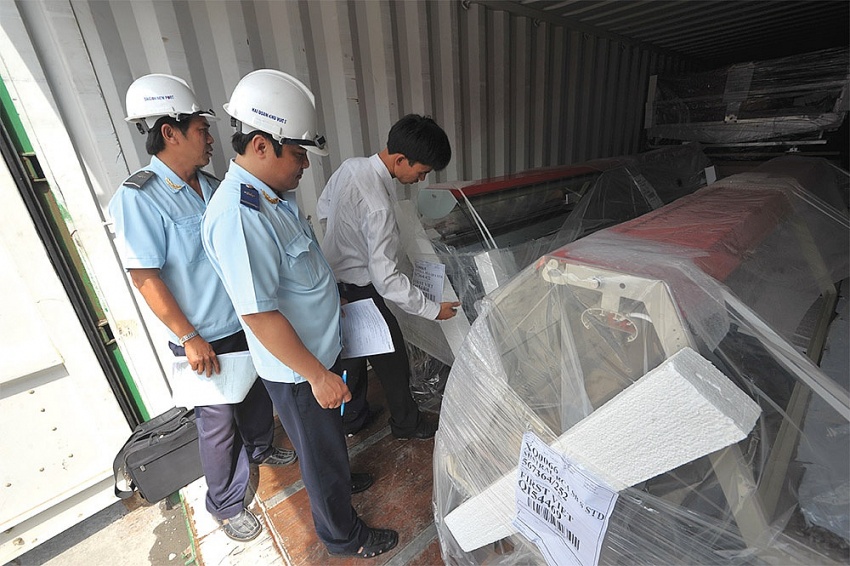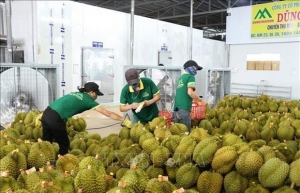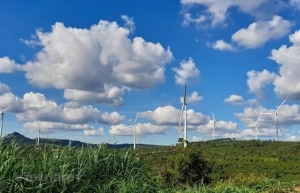ASEAN strength to be built on with trade reforms
 |
| Regulatory improvements will include import and export documentation rules expansion, photo Le Toan |
ASEAN ministers last month introduced over a dozen priority economic deliverables in various sectors, embracing agriculture, tourism, energy, intellectual property, and digital transformation, as well as initiatives to strengthen supply chain and narrow the development gap among ASEAN member states.
When it comes to trade, ministers have agreed to further opening markets to ensure food security and strengthen the resilience and sustainability of the regional supply chain. They will also build foundations for intra-bloc trade facilitation to support supply chain connectivity, as well as utilising digital technology and commerce to support businesses.
Once the activities are implemented, Vietnam’s trade ties with other regional nations could improve. Last year, Vietnam’s total two-way trade with regional nations hit $73.7 billion, with the country suffering from an $8.3 billion trade deficit. Vietnam’s export turnover from ASEAN member states sat at $32.7 billion, down 4.1 per cent on-year, and the country’s import turnover reached $41 billion, down 13.3 per cent on-year.
In the first three months of 2024, bilateral trade hit $20 billion, with Vietnam’s exports of $8.9 billion (up 9.5 per cent), and imports of $11.1 billion (up 9.8 per cent), meaning a trade deficit of $2.2 billion. ASEAN is Vietnam’s fourth-largest export and third-largest import market.
It is expected that this year, representatives from the Ministry of Industry and Trade and the Ministry of Planning and Investment will continue working with peers from the other nine ASEAN member states to discuss a new version of the ASEAN Trade in Goods Agreement (ATIGA).
The updated version will cover tariff liberalisation, rules of origin, non-tariff measures, trade facilitation, customs, technical regulations and conformity assessment procedures, sanitary and phytosanitary measures, and trade remedy measures.
The EU-ASEAN Business Council (EABC) has suggested that regarding trade liberalisation under the ATIGA, specific measures should be explicitly included on the tariff-free treatment of reused, recycled, repaired, and remanufactured goods to speed up movement to a circular economy in ASEAN.
“Remaining tariffs on some goods in some member states should be further eliminated to bring the ATIGA on par with other agreements that have been entered into subsequently,” the EABC said.
In another case, in the chapter on trade facilitation, it is recommended that improvements should include specific and enforceable deadlines for the further expansion of the ASEAN Single Window to include all documentation needed for the import or export of goods.
The ASEAN Secretariat has commended Vietnam’s investment facilitation, which will help attract more investment both inside and outside ASEAN. “Vietnam’s government has continued to reform and take steps to further improve the country’s investment environment, including implementing resolutions and regulatory directives on strengthening information provision, simplifying processes and reducing administrative requirements,” the secretariat stated.
Denny Abdi, Ambassador of Indonesia to Vietnam, said that the two nations share priorities for cooperation in agriculture, fisheries, high-tech industries, renewable energy, and digital economy.
“Indonesia and Vietnam are in a very similar situation: rapid socioeconomic growth driven by its youth, and a vast potential of human and natural resources,” Abdi said. “To ensure these advantages translate into tangible benefits, it is fundamental to collaborate in developing and connecting our resources. This means promoting investment in education, research, and innovation.”
Jaya Ratnam, Singapore’s Ambassador to Vietnam, also said that Singapore and Vietnam are working on bringing their economic cooperation to an even higher level. “The Vietnam-Singapore Connectivity Framework first launched in 2006 has been upgraded this year to include cooperation in energy, sustainability, and innovation. Secondly, we will launch the first annual meeting of our prime ministers, in a format that will enable high-level oversight and direction for our cooperation.”
 | ASEAN employers tend to prioritise AI-skilled talent Hiring AI-skilled talent is a priority for nine in ten ASEAN employers, of which 72 per cent struggle to find the talent they need, highlighting a looming AI skills gap in the region. |
 | Vietnam now China's top ASEAN trading partner Despite the gloomy global economic landscape, trade between Vietnam and China maintained positive momentum last year, with China emerging as Vietnam's largest trading partner in 2023 and trade turnover between the two countries valued at just under $172 billion. |
 | Renewable energy – leading solution to climate change mitigation in ASEAN Investing in renewable energy sources is as a palliative measure for ASEAN to mitigate climate change, according to Vice President of Infrastructure Solutions at Malaysian-based Vertiv Chee Hoe Ling. |
What the stars mean:
★ Poor ★ ★ Promising ★★★ Good ★★★★ Very good ★★★★★ Exceptional
 Tag:
Tag:
Related Contents
Latest News
More News
- France supports Vietnam’s growing role in international arena: French Ambassador (January 25, 2026 | 10:11)
- Foreign leaders extend congratulations to Party General Secretary To Lam (January 25, 2026 | 10:01)
- Russian President congratulates Vietnamese Party leader during phone talks (January 25, 2026 | 09:58)
- Worldwide congratulations underscore confidence in Vietnam’s 14th Party Congress (January 23, 2026 | 09:02)
- Political parties, organisations, int’l friends send congratulations to 14th National Party Congress (January 22, 2026 | 09:33)
- 14th National Party Congress: Japanese media highlight Vietnam’s growth targets (January 21, 2026 | 09:46)
- 14th National Party Congress: Driving force for Vietnam to continue renewal, innovation, breakthroughs (January 21, 2026 | 09:42)
- Vietnam remains spiritual support for progressive forces: Colombian party leader (January 21, 2026 | 08:00)
- Int'l media provides large coverage of 14th National Party Congress's first working day (January 20, 2026 | 09:09)
- Vietnamese firms win top honours at ASEAN Digital Awards (January 16, 2026 | 16:45)






















 Mobile Version
Mobile Version